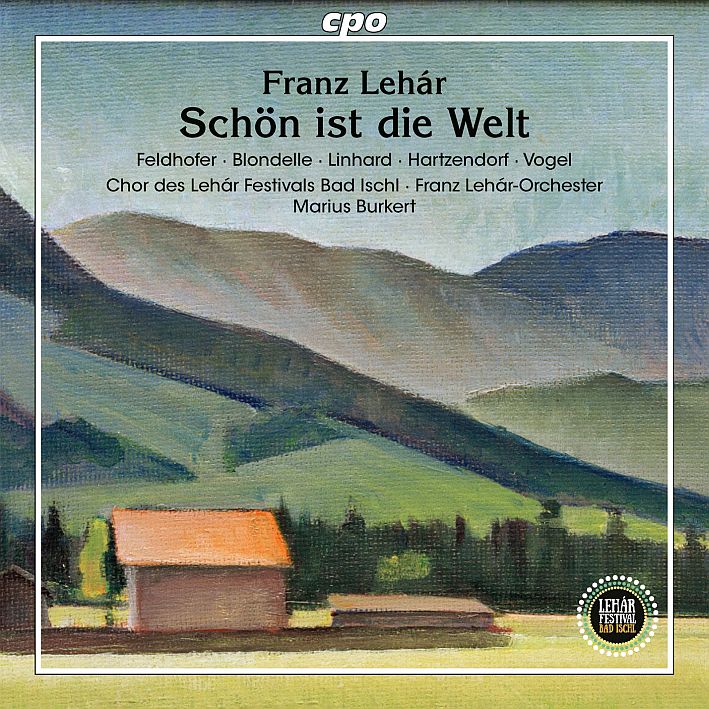LEHÁR Schön ist die Welt (Burkert)
View record and artist detailsRecord and Artist Details
Genre:
Opera
Label: CPO
Magazine Review Date: 11/2024
Media Format: CD or Download
Media Runtime: 97
Mastering:
DDD
Catalogue Number: CPO555 659-2

Tracks:
| Composition | Artist Credit |
|---|---|
| Schön ist die Welt, 'Beautiful World' |
Franz Lehár, Composer
Franz Lehár Orchestra Gerd Vogel, King, Baritone Johannes Hubmer, Hotel Director, Tenor Jonathan Hartzendorf, Count Sascha Karlowitz, Tenor Joseph Terterian, Jazz Singer, Tenor Katharina Linhard, Mercedes della Rossa, Soprano Klára Vincze, Countess Maria Brankenhorst, Soprano Lehár Festivals Chorus Marius Burkert, Conductor Sieglinde Feldhofer, Princess Elisabeth, Soprano Thomas Blondelle, Crown Prince Georg, Tenor |
Author: Richard Bratby
‘The world is beautiful, when luck brings you a fairy tale …’ Lehár’s post-Merry Widow career is studded with fascinating experiments: social realism (Eva), jazz (Clo-Clo), period drama (Friederike). But none is quite as ambitious, or as lovely, as Schön ist die Welt, which finally opened (after many transformations) at Berlin’s Metropol-Theater in December 1930, with Richard Tauber as the star.
Superficially, Ludwig Herzer and Fritz Löhner-Beda’s libretto is classic operetta fare; a rewrite of Endlich allein, Lehár’s 1914 attempt at the same story. A political marriage is being brokered between two unwilling young royals who have never met. They’ve each rebelled and gone incognito, and Prince Georg is smitten by an unknown girl staying at the same Swiss hotel. Princess Elisabeth, meanwhile, is very taken with a young Alpine guide (guess who), and they escape to the mountains together.
The hotel setting supplies a pretext for a playful secondary romance between a courtier and a showgirl, enabling Lehár to give the jazz-loving exponents of Berlin revue-operetta a run for their money. But in the middle comes a second act unprecedented in operetta: a sweeping, almost completely through-composed 40-minute love duet for Georg and Elisabeth as they head into the Alps, complete with a radiant sunset, an avalanche and, of course, soaring, heart-filling vistas rendered in orchestral colours that owe more to Richard Strauss than to Johann.
You don’t have to agree with Stefan Frey’s suggestion (in a comprehensive booklet note) that Schön ist die Welt is the Tristan of operetta but it’s unarguably the Alpensinfonie; and although there’s a vintage Tauberlied for the tenor, ‘Liebste glaub’ an mich’, the show’s rapturous title waltz proves even more memorable, spreading like an Alpenglow across the whole score as a sort of leitmotif for a love that’s longed for and eventually fulfilled. The skies were darkening over Europe, but of Lehár’s last five operettas, Schön ist die Welt is the only one with a hopeful ending.
This is its second recording on CPO and it offers the fullest available version of the (much-revised) score as well as all the spoken dialogue (a mixed blessing for non-German-speakers since CPO – infuriatingly but predictably – has failed yet again to provide text or translations). It’s taken from live performances at the 2023 Lehár Festival Bad Ischl, and it has two enormous strengths. The tenor Thomas Blondelle is utterly glorious as Georg, not attempting to imitate Tauber’s sound but bringing something of the same ardour and sense of style.
Crucially, he really inhabits the character – passionate, sincere and delivering his big set pieces as part of the drama rather than recital lollipops. Georg might be Lehár’s finest tenor role and Blondelle really rises to it. The other definite asset is the conducting of Marius Burkert, a Bad Ischl regular who can make a waltz lilt with his little finger, but here reveals himself as a master of dramatic pacing, and atmosphere, too. If only he’d been able to call on slightly more depth of sound from the Festival Orchestra (ideally, Act 2 needs real Mahlerian plush).
As Elisabeth, Sieglinde Feldhofer’s broad, dark soprano occasionally wobbles right off the note – Elena Mosuc on the earlier Munich disc is altogether more soubrettish (and closer in style to Gitta Alpár, the role’s creator). But Feldhofer’s warm tone blends nicely with Blondelle in their many duets, and she’s clearly committed to the role. The choruses and the smaller roles (and they’re smaller than usual here) are well handled, with Jonathan Hartzendorf and Katharina Linhard engagingly sparky as Sascha and the coquettish Mercedes. I could have done without the bizarre, gargling attempt at jazz vocals in the big Act 1 production number ‘Rio de Janeiro’ – Lehár’s impeccably Austro-Hungarian take on the tango.
But Schön is die Welt is a score that disarms criticism (even the great Mozart scholar Alfred Einstein found it ‘simple, gripping and moving’), and Blondelle and Burkert make this release particularly compelling. If you fell in love with Lehár at Glyndebourne this summer – or simply want to hear the grand master of Silver Age operetta doing something unexpected, touching and really rather wonderful – you shouldn’t hesitate.
Discover the world's largest classical music catalogue with Presto Music.

Gramophone Digital Club
- Digital Edition
- Digital Archive
- Reviews Database
- Full website access
From £8.75 / month
Subscribe
Gramophone Full Club
- Print Edition
- Digital Edition
- Digital Archive
- Reviews Database
- Full website access
From £11.00 / month
Subscribe
If you are a library, university or other organisation that would be interested in an institutional subscription to Gramophone please click here for further information.





